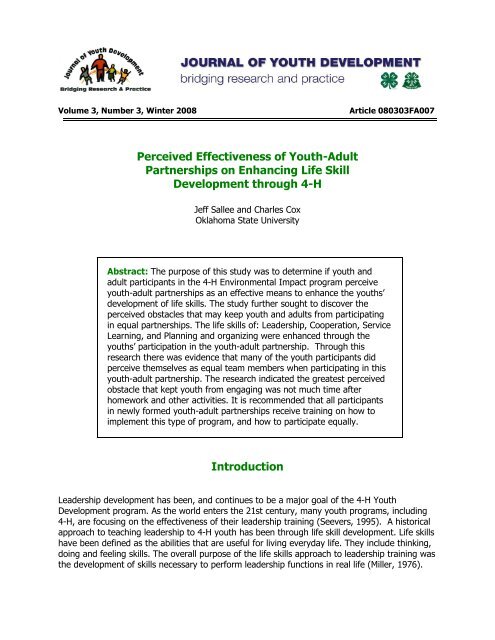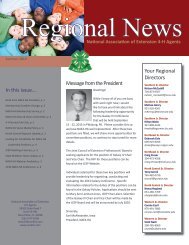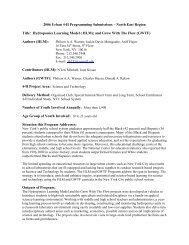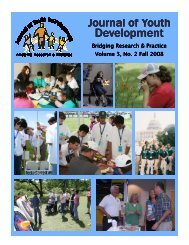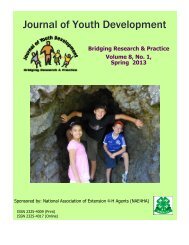- Page 2 and 3:
Winter 2008Volume 3 Number 3Editor
- Page 5:
Examining the Potential Unintended
- Page 8 and 9:
centered, multidisciplinary approac
- Page 10 and 11:
Volume 3, Number 3, Winter 2008Arti
- Page 12 and 13:
fostering skill learning and positi
- Page 14 and 15:
Table 1Participation in out-of-scho
- Page 16 and 17:
ResultsOur analyses were conducted
- Page 18 and 19:
watching TV, playing video games or
- Page 20 and 21:
Accordingly, this research augments
- Page 22 and 23:
Dotterer, A.M., McHale, S.M., & Cro
- Page 24 and 25:
A Descriptive View of the 4-H Club
- Page 26 and 27:
In this paper, the results of a cro
- Page 28 and 29:
section is a set of statements that
- Page 30 and 31:
Table 3Experience in the 4-H clubNo
- Page 32 and 33:
significantly higher than Caucasian
- Page 34 and 35:
p
- Page 36 and 37:
This study focused only on the 4-H
- Page 38 and 39:
Theokas, C., Lerner, J.V., Phelps,
- Page 40 and 41:
Volume 3, Number 3, Winter 2008Arti
- Page 42 and 43:
potential for reaching audiences, d
- Page 44 and 45:
Putting Marketing Concepts into Pra
- Page 46 and 47:
2. Find out what others think about
- Page 48 and 49:
Diem, K.G. (1994). What do youth li
- Page 50 and 51: Promoting Supportive Relationships
- Page 52 and 53: focused on youth-adult relationship
- Page 54 and 55: Conversely, more modern educational
- Page 56 and 57: perhaps most importantly, the effic
- Page 58 and 59: Organized youth programs, when stru
- Page 60 and 61: likely to internalize the positive
- Page 62 and 63: Ellis, J.M., & Caldwell, L.L. (2005
- Page 64 and 65: Schweinle, A., Meyer, D.K., & Turne
- Page 66 and 67: Volume 3, Number 3, Winter 2008Arti
- Page 68 and 69: This study uses the “5 Cs” mode
- Page 70 and 71: ResultsIn this analysis 48 codes we
- Page 72 and 73: Table 3Inductive Codes Classified b
- Page 74 and 75: CompetenceCompetence in organized s
- Page 76 and 77: ecause of him (the coach)…. You d
- Page 78 and 79: practices and competitions, the gir
- Page 80 and 81: Eccles, J.S., & Gootmann, J.A. (Eds
- Page 82 and 83: Smoll, F.L., & Smith, R.E. (2002).
- Page 84 and 85: Volume 3, Number 3, Winter 2008Arti
- Page 86 and 87: The present work builds upon that o
- Page 88 and 89: MethodSample and Data CollectionAs
- Page 90 and 91: (scores ranging from 0 to 8) and a
- Page 92 and 93: Table 2Paired Sample T-tests Compar
- Page 94 and 95: Hypotheses 5 and 6 were tested by c
- Page 96 and 97: De Coverly Veale, D.M.W. (1987). Ex
- Page 98 and 99: Story, M., Neumark-Sztainer, D., Sh
- Page 102 and 103: Cronbach’s Alpha Score For Youth
- Page 104 and 105: 12 to 18 years old. Fourteen of the
- Page 106 and 107: Therefore, there was a mixed relati
- Page 108 and 109: Youth respondents identified two ob
- Page 110 and 111: are developed through working in a
- Page 112 and 113: Seevers, B.S., & Dormody, T.J. (199
- Page 114 and 115: Volume 3, Number 3, Winter 2008Arti
- Page 116 and 117: With the many opportunities that yo
- Page 118 and 119: meaningfully reduced involving dedu
- Page 120 and 121: StaffingXTime/Schedule X X XTrainin
- Page 122 and 123: “Involving adults that will allow
- Page 124 and 125: “They can't drive or do not have
- Page 126 and 127: page in understanding why youth voi
- Page 128 and 129: Parker, L. (1999). If all youth ser
- Page 130 and 131: Volume 3, Number 3, Winter 2008Arti
- Page 132 and 133: However, the literature is mixed in
- Page 134 and 135: group was the quality of the progra
- Page 136 and 137: Table 1Reasons for Non-Attendance:
- Page 138 and 139: easons given was six. Sixty-three p
- Page 140 and 141: The non-family-related activities t
- Page 142 and 143: “Catch ‘Em Being Good:”An Ext
- Page 144 and 145: In 2001, the WVUES received a schoo
- Page 146 and 147: to leverage the resources of the co
- Page 148 and 149: 4. Most primary behavior incidents
- Page 150 and 151:
Recommendations for developing prog
- Page 152 and 153:
Cross-Cultural UnderstandingThrough
- Page 154 and 155:
that plague these nations such as p
- Page 156 and 157:
2003). Youth leadership training in
- Page 158 and 159:
• enable these young people to pa
- Page 160 and 161:
We believe that the USPORT program
- Page 162 and 163:
West Virginia’s Response to theRo
- Page 164 and 165:
Ensuring good oral health requires
- Page 166 and 167:
Table 1Correlations between Planner
- Page 168 and 169:
problems in this rural state…This
- Page 170 and 171:
Volume 3, Number 3, Winter 2008Arti
- Page 172 and 173:
vacuum. Determination of factors, a
- Page 174 and 175:
ReferencesBaldwin, C., & Caldwell,
- Page 176 and 177:
Volume 3, Number 3, Winter 2008Arti
- Page 178 and 179:
Purpose of StudyThe purpose of this
- Page 180 and 181:
Students in the High computer gamin
- Page 182 and 183:
Do Higher Levels of 4-H LeadershipA
- Page 184 and 185:
IntroductionEmotional Intelligence
- Page 186 and 187:
second section examined demographic
- Page 188 and 189:
a constructive manner. The group is
- Page 190 and 191:
differences in the scores for the 1
- Page 192 and 193:
Adaptability include “Reality Tes
- Page 194 and 195:
ReferencesAmerican Academy of Pedia
- Page 196 and 197:
Healthy Kids, Healthy Families:A Co
- Page 198 and 199:
and a half million U.S. youth (ages
- Page 200 and 201:
Families. In partnering counties, p
- Page 202 and 203:
Healthy Families was then offered a
- Page 204 and 205:
Kamberelis, G., & Dimitriadis, G. (
- Page 206 and 207:
Volume 3, Number 3, Winter 2008Arti
- Page 208 and 209:
Change It Up!What Girls Say About R
- Page 210:
In addition, the study summarizes t


